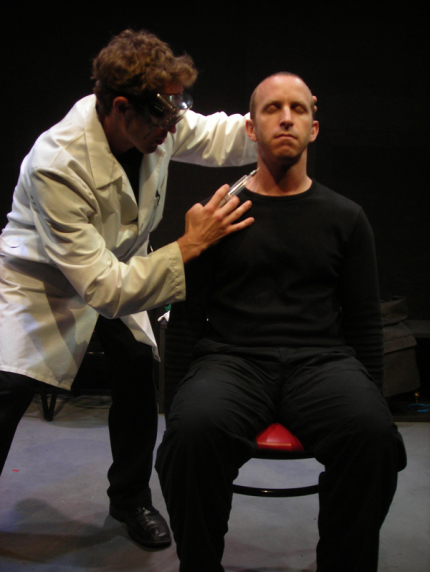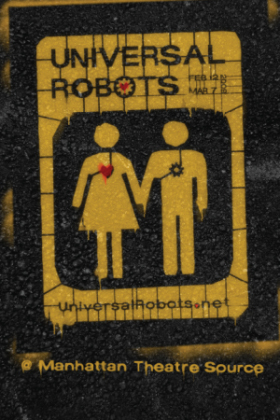As both a theatre geek and a hopeless robot fangirl, I’ve been obsessed with the fact that the word “robot” was coined in Karel Čapek’s 1921 play Rossum’s Universal Robots ever since I can remember. I’ve always wanted to see R.U.R., so I was thrilled to hear that Manhattan Theatre Source was staging Universal Robots, a play by Mac Rogers that was “freely adapted” or “inspired by” by R.U.R.
Thing is, I’m not sure I believe that Universal Robots is an adaptation of R.U.R. Mac Rogers makes no bones about the fact that barely any of the original play has made it into this production. What he’s created instead is a new creature, a unique amalgam of R.U.R.‘s basic sentiments, stories from Čapek’s life, Czechoslovakian history, and his imagination. The result is probably the finest piece of Karel Čapek RPS ever written. Since I have a hard time convincing even myself that that’s a legitimate compliment, let’s try this: Universal Robots is a complex and novel piece of work, vexing in parts, but invigorating enough on the whole that every science fiction fan and most mainstream theatregoers will find it rewarding.
First, the hard part: one of the most common ways nearly-great plays go wrong is that their author fails to get the ending right. The biggest problem with Universal Robots is that Rogers didn’t know where to start it. With a tagline that begins “The year is 2009. The last human being died in 1971,” most audience members are probably expecting a play chock-full of robot-on-human action, and they have every right to. What the first half of the play gives them instead is a crash course in Czech political history and the revolutionaries who sought to undermine it; a rundown of Čapek’s literary output and his philosophy of art, including a defense of why fantastical notions deserve as much respect as realism does; a glimpse into the arguments of an intelligentsia of a different age; and the evolving story of how the wife of Rossum, a deceased scientist, carries out his dreams of building robots after his death, and eventually becomes the official robot-maker to the Czech state. Unfortunately, conversations about creativity are rarely as interesting as the creative output itself; Karel’s argument that theatre should be fun is undermined by an excerpt from one of his plays that follows none of his own principles; and his smart friends are not written brilliantly enough to feel like intellectuals or interestingly enough to give us pleasure in their company. In fact, it is only the last of Rogers’ four major themes that is particularly interesting from a dramatic standpoint. The first act is not quite a slog—Rogers is very talented with dialogue, and I’m sure these topics are vibrant for someone who has done years of his research on them like he has—but it could be twenty minutes shorter, and both the audience and the actors seemed underwhelmed in parts. I emerged for intermission feeling edified* but not particularly enthralled.
But I’m glad I returned: complete turnarounds are a rarity in any medium, so I was pleasantly surprised by how different—and how much better—the second half of the show was. For one thing, the script finally abandons several of its fragmented narratives and begins to tell a unified story with its own internal propulsion. For another, we finally get to see Rossum’s robots in action. The cast and director are clearly elated by these developments, and the transformation is magnificent. The result is an hour or so of theatre as taut, dense, and exciting as anything I’ve seen this year. As with most of the great fictional robots, you leave convinced that Rossum’s forged machines have more potential for humanity than most humans you know. The melodrama that inevitably accompanies this lesson is present but not cloying, and the play deals especially gracefully with the delicate question of whether objects of our creation have a Darwinian prerogative just like we do. Being able to write interestingly about science, politics, and their implications for society is a rare and commendable skill, and Rogers makes us care as much about these robots’ love stories, war stories, and the birth of their nation as we do about any such narrative. Nothing in this play will blow the mind of anyone who’s reasonably familiar with science fiction media, especially Star Trek. But we must not forget how good the writing on Star Trek sometimes was, and how rare a treat it is to see something of its ilk brought to the stage.
The other main selling point of Universal Robots is the caliber of the ensemble members, who do some stunning work—I dare anyone to try to gather ten finer actors on an $18/ticket budget. Nearly every role had great moments, so I’m hesitant to single anyone out, but Jason Howard’s Radius, Nancy Sirianni’s Rossum, Ben Sulzbach’s Peroutka, and Jennifer Gordon’s Jo were especially a treat to watch. Rosemary Andress’ direction must have been crucial in getting a complex work running smoothly on such a small stage; my biggest quibble with her interpretation is that I wish the cast hadn’t been allowed to play so fast and loose with the provenance of their accents. This is not a flashy production—the props and the set are minimal, so its only indulgence is a collection of finely-tuned costumes by designer Nicky J. Smith—but the words and cast fill the stage enough that nothing feels lacking.
The quality of Universal Robots is especially impressive given the price of entry and the fact that Manhattan Theatre Source does double duty as a not-for-profit arts service organization. I hope it’s not taken as a denigration of MTS’ efforts if I say that I hope the show is restaged somewhere bigger someday: mostly because the space is so small and the run so short that far too few people will be able to see this production; but also because one or two more drafts of UR could make it a science fiction play for the ages. Consequently, unless you’ve got the cold, steel heart of a robot, you should see it now, so you can say you saw it when.

Pictured: Ben Sulzbach and Jason Howard in a scene from the 2007 workshop of Universal Robots. Image courtesy of Manhattan Theatre Source.
Universal Robots is playing Wednesdays through Fridays at 7:30 p.m. and Saturdays at 2 and 7:30 p.m. at Manhattan Theatre Source (177 Macdougal St, New York, NY) through March 7, 2009. Tickets are $18 and can be purchased from OvationTix or by calling 212-501-4751.
* Though, beware: the script plays fast and loose with many facts, including the gender of Čapek’s sibling.










